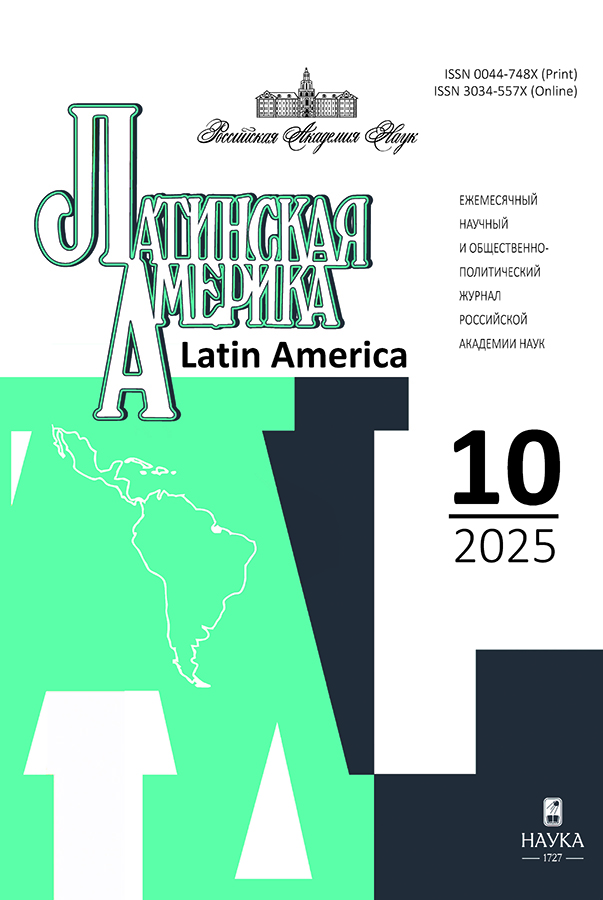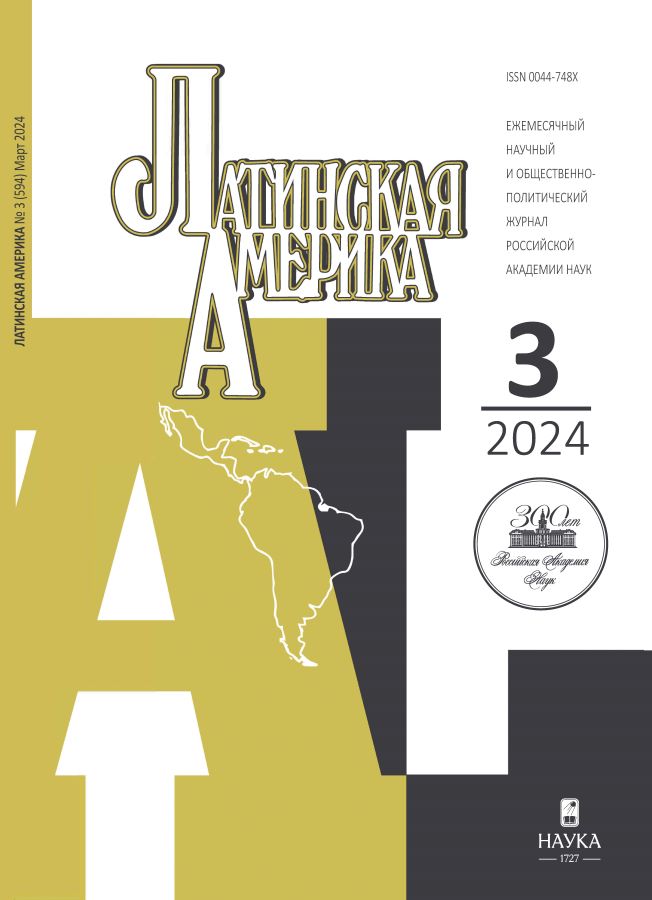Компартия Боливии: вызовы герильи и формирования политических союзов
- Авторы: Щелчков А.А.1
-
Учреждения:
- Институт всеобщей истории РАН
- Выпуск: № 3 (2024)
- Страницы: 74-89
- Раздел: Страницы истории
- URL: https://rjmseer.com/0044-748X/article/view/667954
- DOI: https://doi.org/10.31857/S0044748X24030055
- ID: 667954
Цитировать
Полный текст
Аннотация
В данной статье рассматривается положение, сложившееся в Коммунистической партии Боливии (Partido Comunista de Bolivia, PCB) в самый драматический для левого, революционного движения Латинской Америки период, — в так называемые долгие 60-е. Это было время прямой конфронтации сил реакции и прогресса, время острого идейного противостояния, обновления левых и поиска новых форм борьбы. Боливийским коммунистам пришлось нести груз принятия решений, связанных с герильей Эрнесто Че Гевары в их стране. Трагическая развязка эпопеи Че стала толчком для революционного подъема в Боливии, появления прогрессивных военных режимов, попытки создания органов народной власти — Народной ассамблеи, где протагонизм коммунистов был неоспорим. В статье анализируются политика PCB по выбору союзников, идеологические концепции «демократии масс» как период перехода к социализму и попытки их реализации в рамках электорального союза с Народным и демократическим единством (Unidad Democrática y Popular, UDP), войдя в который PCB в начале 1980-х годов стала одной из правящих партий. Этот неудачный опыт «хождения» компартии во власть привел к тяжелому внутреннему кризису и фактическому исчезновению PCB как важного актора боливийской политики.
Ключевые слова
Об авторах
Андрей Аркадьевич Щелчков
Институт всеобщей истории РАН
Email: sch2000@mail.ru
ORCID iD: 0000-0002-7780-781X
доктор исторических наук, главный научный сотрудник РФ, 119334 Москва, Ленинский пр-т, 32а
Список литературы
- Грамши А. Избранные произведения. М., Издательство политической литературы, 1980, 422 c.
- Щелчков А.А. История левых сил: создание компартии Боливии. «Поздний ребенок» коммунистического движения. Латинская Америка. М., № 4, 2023, сс. 79-93.
- Справка советского посольства на Кубе от 16 июля 1965 г. РГАНИ. Ф. 5, оп. 50, д. 692.
- El Che en Bolivia. Documentos y Testimonios. Carlos Soria Galvarro, recopilación, notas etc. t. 4, La Paz, La Razón, 2005, 223 p.
- Dunkerley J. Rebelión en las venas. La lucha política en Bolivia 1952-1982. La Paz, Plural, 2003, 209 р.
- Jeifets L., Jeifets V. «Discúlpanos, Mario: te hemos engañado», - eran las palabras del Ché. La entrevista con Mario Monje Molina. Pacarina del Sur. N21, octubre-diciembre, 2014. Available at: http://pacarinadelsur.com/home/figuras-e-ideas/1031-disculpanos...-eran-las-palabras-delche-la-entrevista-con-mario-monje-molina (accessed 22.06.2023).
- Запись беседы с представителем PCB на Кубе Лорхио Вака в посольстве СССР 11 апреля 1966 г. РГАНИ. Ф. 5, оп. 50, д. 765.
- Запись беседы с М.Монхе в советском посольстве в Гаване от 24 августа 1964 г. РГАНИ. Ф. 5, оп. 50, д.600.
- Запись беседы с М.Монхе в посольстве СССР на Кубе 16 мая 1966 г. РГАНИ. Ф. 5, оп. 58, д. 301.
- Prescencia. La Paz. 05.10.1970.
- Lazarte R.J. Movimiento obrero y procesos políticos en Bolivia. (Historia de la C.O.B. 1952 — 1987). La Paz, Edobol, 1989, 289 p.
- Запись беседы с Симоном Рейесом 15 декабря 1970 г. РГАНИ. Ф. 5, оп. 63, д. 721.
- Запись беседы с поверенным в делах ВНР в Боливии Живо Пейяком 15 февраля 1971 г. РГАНИ. Ф. 5, оп. 63, д. 721.
- Partido Comunista de Bolivia. Tesis programática aprobada en el III Congreso Nacional. Junio de 1971. Suplemento al N409 de Unidad. La Paz, Unidad. 1971, 25 p.
- Запись беседы с Эрнесто Натушем в советском посольстве 3 марта 1971 г. РГАНИ. Ф. 5, оп. 63, д. 721.
- Lora G. Historia del POR. Contribución a la historia política de Bolivia. T. 3, La Paz, Islas ed., 1978. Available at: https://oceanofpdf.com/authors/guillermo-lora/pdf-contribucion-a-lahistoria-politica-de-bolivia-download/ (accessed 22.06.2023).
- Запись беседы с Эрнесто Натушем в советском посольстве 25 мая 1971 г. РГАНИ. Ф. 5. Оп. 63. Д. 721.
- Lora G. El proletariado en el proceso político. 1952-1980. La Paz, Masas ed., 1980, 564 p.
- Bolivia, hoy. México, Siglo Veintiuno Editores, 1983, 240 p.
- Zavaleta Mercado R. El poder dual en América Latina. Estudio de los casos de Bolivia y Chile. México, Siglo XXI ed., 1974, 263 p.
- Задачи коммунистов в обстановке, созданной приходом к власти фашизма. РГАНИ. Ф. 5, оп. 69, д. 720.
- Запись беседы с поверенным в делах ВНР в Боливии Живо Пейяком 13 сентября 1971 г. РГАНИ. Ф. 5, оп. 63, д. 721.
- Запись беседы с Хорхе Колле в советском посольстве 9 августа 1971 г. РГАНИ. Ф. 5, оп. 63, д. 721.
- Запись беседы с Симоном Рейесом в советском посольстве на Кубе 4 февраля 1972 г. РГАНИ. Ф. 5, оп. 64, д. 686.
- Запись беседы с кандидатом в члены ЦК PCB А. Вильяльпандо, 3 мая 1974 г. РГАНИ. Ф. 5, оп. 67, д.925.
- Запись беседы с Абелярдо Вильяльпандо в советском посольстве 20 декабря 1975 г. РГАНИ. Ф. 5, оп. 69, д. 2833.
- О новых моментах во внутриполитическом положении в Боливии и внутренней политике правительства. Политписьмо. 17 июля 1977 г. РГАНИ. Ф. 5, оп. 73, д. 1835.
- Запись беседы с М. Домич, 04 ноября 1978 г. РГАНИ. Ф. 5, оп. 75, д. 1353.
- Documentos. Novena Conferencia nacional. Partido Comunista de Bolivia. La Paz, 1978. (mimeo).
- Editorial. Temple. La Paz. N71. enero, 1980.
- Barrenechea R. La clase obrera, el poder y la democracia. Unidad. N503, Аbril de 1980.
- Barrenechea R. Democracia de masas contra “democracia viable”. Unidad. N490, Junio de 1979.
- Dunkerley J., Morales R. The crisis in Bolivia. New Left Review. London, N155. January — February, 1986.
- Alvarado A. Educación revolucionaria de la juventud. Unidad. N 635, 8-14 de junio de 1985.
- Recuperemos al partido. Marxismo militante. Nueva época. N 1, 1985.
- Reyes Rivera S. Un congreso histórico y de victoria. La Paz, S.D., 1985, 7 p.
- Balance del V Congreso Nacional. Unidad. N 636, 15-21 de junio de 1985.
- Derrotaremos la agresión fraccional. Unidad. (PCB oficial). N 637, 5 julio de 1985.
- Hacia el congreso extraordinario. Unidad. (PCB oposición). N 639, 6-12 de julio de 1985.
- Editorial: ¿Quiénes están contra la unidad del partido? Unidad. (PCB oposición). N 639, 6-12 de julio de 1985.
- Urgente: construir la dirección política del pueblo. Unidad. (PCB oposición). N 637, 22-28 de julio de 1985.
- Resolución sobre el grupo oportunista de derecha. Marxismo militante. Nueva época. N 1, 1985.
- Los comunistas de nuevo en el cauce de la lucha popular. Marxismo militante. Nueva época. N 1, 1985.
- El PCB, el partido para la revolución. Marxismo militante. Nueva época. N 1, 1985.
- Traverso E. Melancolía de izquierda. Marxismo, historia y memoria, Buenos Aires, FCE, 2018, 412 p.
- Беньямин В. Девять работ. М., Панглосс, 2019, 223 с.
Дополнительные файлы










